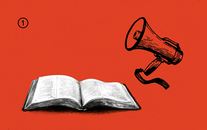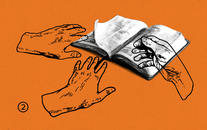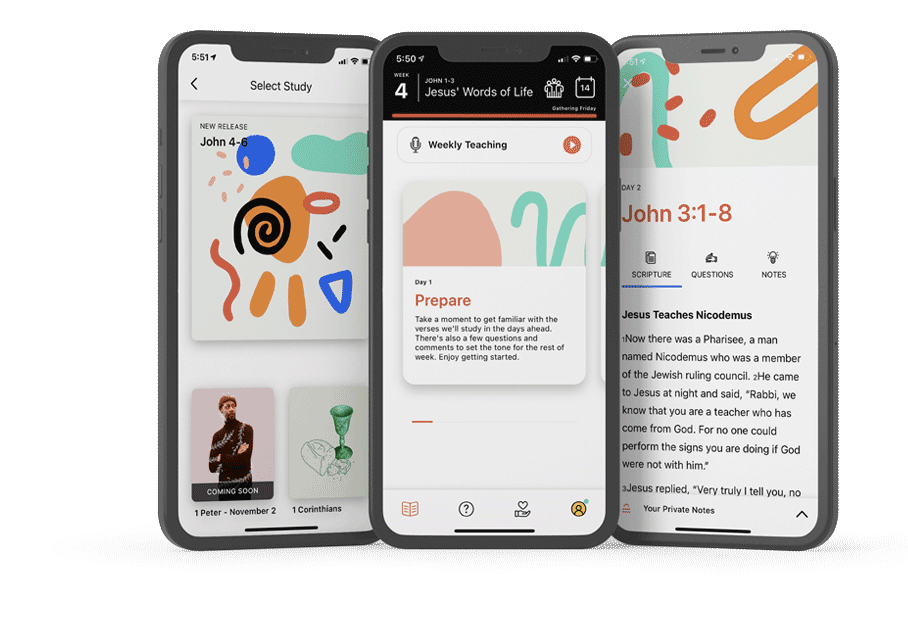
Here at WordGo we believe that spending regular time in the Bible is crucial to growing in our walk with the Lord. But sometimes we can get a bit stuck. Here are seven ways you can reconnect with God’s living Word.
Reading the Bible audibly brings different benefits to reading silently. When you read aloud, it helps you to concentrate, visualize and remember what you are saying. Actually hearing the words back also means you can slowly digest important truths, rather than skim over them.
One fun way to experiment with this is to read a verse several times, emphasizing different words as you go. Try this out with the verse below and enjoy hearing God speak to you in new ways!

“For God so loved the world …” God, who created the world and life itself...
“For God so loved the world …” unchanging, undeserved, steadfast love...
“For God so loved the world …” a world that would wish Him crucified...
(John 3:16)
Reading the Bible with others strengthens your faith. In Bible times, literacy levels were low, and copying text was laborious and expensive. It was common for believers of all races, ages and social classes to gather together to hear Scripture read aloud. This meant that many biblical texts were written with hearers rather than readers in mind (Col 4:16). Today, communal Bible reading helps us identify with the first Christians, anchors us to God’s Word in community, and connects us to believers across denominations, countries and backgrounds. Here are some ways you can do this with others:
- Meet your friends online every morning for ten minutes before work to read through a Bible book together, one chapter at a time.
- Take it in turns to record a voice memo of a passage that has particularly encouraged you.
- Whenever you meet, read the same passage in different versions.

Are you struggling to spend time in the Bible and prayer? You could start by doing both at once – praying Scripture itself! Jesus taught His disciples to pray by giving them specific words to use in ‘The Lord’s Prayer’ (Matt 6: 9-13; Luke 11:1-4). The early Church also often directly quoted Scripture when they were praying (Acts 4:25-6). When we pray God’s Word today, we declare and meditate on God’s unchanging truth and promises in a changing world. One great way to start is by beginning each day with a short prayer from the Bible. Here’s a example of what this could look like for you:

Sunday: “Satisfy us in the morning with your unfailing love, that we may sing for joy and be glad all our days.” (Psalm 90:14)
Monday: “When I wake up, you are still with me.” (Psalm 139:18)
Tuesday: “In the morning, Lord, you hear my voice; in the morning I lay my requests before you.” (Psalm 5:3)
Wednesday: “Let the morning bring me word of your unfailing love, for I have put my trust in you.” (Psalm 143: 8-10)
Thursday: “This day belongs to the Lord! Let's celebrate and be glad today.” (Psalm 118:24)
Friday: “Lord, be gracious to us; we long for you. Be our strength every morning, our salvation in time of distress.” (Isaiah 33:2)
Saturday: ‘’The steadfast love of the LORD never ceases; his mercies never come to an end; they are new every morning; great is your faithfulness.” (Lamentations 3:22-23)
Did you know that there are at least 185 songs in Scripture? The book of Psalms is the chief hymnal of the Bible and is packed full of exhortations to ‘extol him [God] with music and song’ (Ps 95:2). Throughout the ages, God’s people have been stirred, strengthened and spurred on in their faith as they have savored the Word of Christ through singing ‘psalms and hymns and spiritual songs’ (Col 3:16)
It’s unsurprising, then, that one of the most effective ways of meditating on biblical truth is by putting it to music! Make a Youtube or Spotify playlist and reflect on a new or favorite passage that way. Here’s a sample playlist based on Psalm 23:

- Psalm 23 (Stuart Townend)
- When you Shepherd me (Brian Doerksen)
- The Lord is my Shepherd (Shane and Shane)
- Psalm 23 (I am not alone)’ (People and Songs)
- The Lord is my Shepherd (Keith and Kristyn Getty, Tom Douglas)
God knows how easily distracted we can be when it comes to learning, understanding and applying Scripture. Perhaps that’s why He told the Israelites to fill their lives and homes with His words. At the time of Jesus’ earthly ministry, the Pharisees took the instructions from Deut 6 very seriously; they literally ‘wore’ Scripture verses contained in a small box tied to their wrists and across their foreheads. This is a tradition that many Jewish men still practice today.
But you don’t have to tie Bible verses across your forehead to keep God’s Word in full view; you can saturate your day in Scripture by filling your environment with it! Wear it on your jewelry or clothing, write it on your kitchen chalkboard or office whiteboard, or display it in frames around the house! The more you see truth in front of you, the more it will sink into your heart and mind.

Jewish boys in Jesus’ day often had the first five books of the Old Testament memorized by the time they were just 13! Memory verses are something we tend to associate with something kids do at Sunday School. But this practice is really important for adults too. Memorized verses are forever yours, even when you don’t have a Bible to hand. When we hide His Word in our hearts, we are blessed (Psalm 119:1); we can battle temptation (v9); our faith is strengthened (v28); we walk in freedom (v45); and we gain wisdom for life (v105). If you want to begin committing Scripture to memory, start with small chunks. Read it out loud, read it with others, listen to it, sing it, copy it by hand and keep it visible to ensure it stays with you!
Here are some of our favorites to help you get started:

- “In the beginning God created the heavens and the earth.” (Gen 1:1)
- “Jesus answered, ‘I am the way and the truth and the life. No one comes to the Father except through me.’” (John 14:6)
- “For all have sinned and fall short of the glory of God.” (Rom 3:23)
- “And we know that in all things God works for the good of those who love him, who have been called according to his purpose...’” (Rom 8:28)
Actions speak louder than words, and the most active way possible to engage with Scripture is to do what it says!
Hearing it, speaking it, singing it, memorizing it and writing it down should lead to us living it! Knowing what the Bible says takes effort, but actually doing what it instructs is much harder; it can sometimes be difficult to know where to start! Yet those who “look intently” into God’s commands and go on to do them “will be blessed” (James 1:29).
One way you can move from simply absorbing information to experiencing transformation is by asking yourself what your next step should be every time you read, hear or study God’s Word. You might find the STEP acrostic below useful to have on hand as you seek to actively live out the script of Scripture:
Sinful thoughts or behaviour to confess?
Truth to understand, believe or claim?
Example to follow?
Practical action to take?

We want to make it as simple as possible for you to get into Scripture, and stay in it. The WordGo Bible app is a fully-resourced Bible study experience, which helps you to gather your friends anytime, anywhere and study Scripture in a deep, meaningful way. When we engage with the Bible in community, we not only learn together, but we encourage each other to live it out too. Want to fill your world with God’s life-giving Word? Download the WordGo Bible app today.



